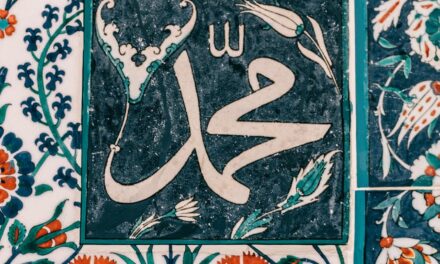Many people become confused and fail to differentiate between the realities having to do with Allah’s orders, his deen which He has enjoined on the human and the jinn, and the imaan of His slaves on the one hand, and the realities having to do with His creation, His decree, and His complete power and control over everything in the universe and all events which occur therein. To Allah belongs creation (Al-khalq) and authority or command (Al- amr), as He said in the Qur’an:
“Verily your Lord is the one who created the heavens and the earth in six days and then sat on the throne. He covers the day with the night which seeks it persistently (is never late in its succession). The sun, the moon and the stars are subjugated to His command. Verily, His is the creation and the command, blessed is Allah, Lord of the worlds.” Qur’an 7:54
Thus, Allah is the Creator of all things and their Lord and their Sovereign. There is no other creator other than Him, nor any other Lord. Whatever He wills is and whatever He does not will is not. Everything which is in the universe, motion and lack of motion is by His decree and His power, His will, His decision, and His creation of it. Furthermore, Allah has ordered His creation to obey Him and to obey His prophets, and forbid them to disobey Him and to disobey His prophets. He has ordered us with Tauhid and Ikhlaas (absolute sincerity of intention and worship for Allah ta’ala), and has forbidden us associating anything with Allah. The greatest of good deeds is Tauhid, and the worst of sins is associationism (shirk). Allah says:
“Verily Allah does not forgive the associating of partners with Him, and He forgives anything less than that to those whom He wishes. Whoever associates partners with Allah has gone very far astray indeed.” Qur’an 4:116
“And among the people are those who make others as equals to Allah. They love them as the love of Allah, but those who believe are more intense in their love of Allah.” Qur’an 2:165
In the two books of Muslim and Bukhari, Ibn Masood narrates:
I said: “O, Messenger of Allah (ﷺ), which sin is the most serious?” He said: “To make a partner with Allah though He created you.” I said: “And then what?” He said: “That you kill your offspring for fear that he will eat with you.” I said: “And then what?” He said: “To commit adultery with the spouse of your neighbor.”
Allah reaffirmed the content of this hadith when He revealed the following verse:
“Those who do not call to any other deities along with Allah, do not kill the soul which Allah has forbidden except with the right to do so, and do not commit illegal sexual acts. Whoever does that will meet athaama (a pit in hell reserved for the punishing of adulterers). His punishment will be multiplied on the day of Qiyama, and he will stay in it forever, debased. Except for those who repented, believed, and did good works, for these Allah will change their misdeeds into good deeds and Allah is ever forgiving, merciful.” Qur’an 25:68-70
Allah has enjoined justice, kindness, and giving to (needy) relatives, and forbidden obscenity, disreputable acts, and transgression on the rights of others. He has informed us that He loves those who have taqwa, those who do good and are kind, those who are just, those who frequently repent, those who keep themselves clean and pure, and those who fight in His path in a solid line, as if they are a mortared building. He has also informed us that He hates that which He has forbidden, as He said in sura Al-Israa’:
“The evil of all such things is hateful in the sight of your Lord.” Qur’an 17:38
In the verses before this verse, Allah forbids associating partners with Him, rudeness to parents, He ordered the giving of relatives all of their rights, forbid mis-use of wealth, miserliness and the tying of one’s hand to his neck (i.e. withholding ones wealth and being miserly), or spreading it all the way out (i.e. being too openhanded with ones wealth to the detriment of one’s own needs and the needs of those under one’s responsibility), He forbid killing of humans without justification, illegal sexual acts, and handling the property of orphans except in ways to their benefit. Following all of this, Allah said: “The evil of all such things is hateful in the sight of your Lord.”
Allah does not like corruption, and is not pleased with the disbelief of any of His slaves. The worshipper is ordered to repent to Allah constantly, as Allah said:
“And repent to Allah all of you O, believers in order that you may be successful.” Qur’an 71:21
In Sahih Bukhari, it is narrated that the Prophet (ﷺ) said:
“O, people, repent to your Lord for, by the one in whose hand by soul is, I seek forgiveness of Allah and repent to Him each day more than seventy times.”
In Sahih Muslim, it is narrated that the Prophet (ﷺ) said:
“Verily clouds come over my heart, and I seek forgiveness from Allah one hundred times in a day.”
In the books of As-Sunan, Ibn Umar narrates that:
“We used to count the Prophet (ﷺ) saying “My Lord, forgive me and accept my repentance. Surely You are the ever-returning, the Merciful.” one hundred times in a single session.” In another version he said: “more than one hundred times.”
Allah has ordered the Muslims to end good works with the seeking of His forgiveness. The Prophet (ﷺ) (sallallahu `alayhi wa sallam) used to seek Allah’s forgiveness three times after the conclusion of every prayer and then say:
“O, Allah you are the Peace and from you is peace blessed are you O possessor of Greatness and Beneficence.”
as has been reported in a sahih hadith from the Prophet (ﷺ). Allah mentioned in the Qur’an talking about the believers:
“Those who seek forgiveness in the small hours of the night.” Qur’an 3:17
ordering them to stand in prayer in the night, and seek His forgiveness in the small hours of the night.
Likewise, Allah concluded the sura entitled Al-Muzammil, which is the sura which discusses the night prayer, by saying:
“And seek the forgiveness of Allah, verily Allah is Forgiving, Merciful.” Qur’an 73:20
And, about the pilgrimage, Allah says:
“So, when you descend en masse from Arafat, mention Allah in the sacred precincts, and remember Him and how He guided you even though you were before that of those gone astray. Then, move on by the same route as the people and seek the forgiveness of Allah. Verily Allah is Forgiving, Merciful.” Qur’an 2:199
Moreover, Allah sent down near the end of the Prophethood when the Prophet (ﷺ) went out on the expedition of Tabuk (the last of his expeditions):
“Allah has turned to His Prophet (ﷺ) (i.e. accepted his repentance) and the migrators and the helpers and those who followed him in the time of difficulty after the hearts of one party of them nearly became diseased. Then, Allah turned to them, He is with them Compassionate, Merciful. (He has also accepted the repentance of) the three who stayed behind (who were boycotted by the Muslims on the order of the Prophet) until the earth seemed to squeeze in on them in spite of its spaciousness, and the remorse pressed in on them and they realized that there was no where to run from Allah except by running back to Him and seeking His acceptance. Then Allah turned to them in acceptance that their repentance may be complete. Verily Allah is the ever-returning, the Merciful.” Qur’an 9:117-118
This was one of the last verses to be sent down.
It has been said that the last verse to be sent down was:
“When the help of Allah come and victory * And you see the people coming into the deen of Allah in droves * Celebrate the praises of your Lord and seek His forgiveness, verily He is ever returning with acceptance.” Qur’an 110
in which Allah ordered the Prophet to conclude his work with the praises of Allah and the seeking of His forgiveness.
Aisha reports in the two books of sahih that the Prophet (ﷺ) (sallallahu `alayhi wa sallam) used to say in bowing and in prostration:
“Glorified are you O Allah, our Lord and with Your praise. O Allah, forgive me.” Aisha commented: “Putting the Qur’an into practice.”
Also in the two books of sahih, it is reported that he used to say:
“O, Allah forgive me my mistakes and my ignorance, and my excesses in my affairs and all that which you know better than I. O, Allah forgive me (mistakes done in) jest and in earnest, (and those done) unintentionally and intentionally, and all of that which I may have. O, Allah forgive me that which has come before and that which is still coming, that which I hide and that which I make public – there is no deity but You!”
Also in the two books of sahih is that Abu Bakr said:
“O, Messenger of Allah (ﷺ), teach me a du’a (supplication) with which I can ask Allah in my prayer.” The Prophet (ﷺ) said: Say: “O, Allah, surely I have oppressed myself to a great degree and none can forgive sins except for You. Forgive me with a forgiveness from You and have mercy on me, verily, you are the Forgiving, the Merciful.”
And, in the books of hadith known as As-Sunan, it is narrated that Abu Bakr said to the Prophet (sallallahu `alayhi wa sallam):
“O, messenger of Allah (ﷺ), teach me a du’a (supplication) with which I can ask Allah in the morning and the evening.” The Prophet (ﷺ) said: Say: “O, Allah, Originator of the heavens and the earth, Knower of the unseen and the visible, Lord of everything and its sovereign, I bear witness that there is no deity other than You. I seek refuge in You from the evil within myself, from the evil of the shaitaan and his associationism, and from anything which would bring evil to me or to any other Muslim.” Say it when you get up in the morning, in the afternoon, and when you lie down to sleep.
Clearly, it is not allowed for anyone to imagine that he is not in need of repenting to Allah and seeking His forgiveness for his sins. Rather, everyone is in constant need of that. Allah said:
“We offered this trust to the heavens and the earth and the mountains, but they refused to accept its burden and were afraid of it. Then man took it on, verily he is ever prone to criminality, ever prone to foolishness. * That Allah may punish the hypocrites, male and female and the associationists, male and female, and turn in acceptance to the believers, male and female, and Allah is Forgiving, Merciful.” Qur’an 33:72-73
So man is criminal and foolish in nature, and the goal of the believing men and women is repentance. Allah has informed us in His book of the repentance of His righteous slaves and His forgiveness of them.
In the two books of sahih, it is recorded that the Prophet (ﷺ) said:
“No one will enter paradise by his actions.” The companions asked him: “Even you, O, messenger of Allah (ﷺ)?” He said: “Even me, unless Allah envelopes me in His mercy and His grace.”
This does not represent a contradiction of the verse in the Qur’an which reads:
“Eat and drink because of your works which preceded in the days which have passed.” Qur’an 69:24
The hadith rejected the equivalence between the good works of the people of paradise and their reward from Allah and rejected the idea of the reward of paradise being in exchange for these good works in this life. The verse from the Qur’an, on the other hand established the causal relationship between obeying Allah in this life and being rewarded with paradise in the next.
As for the statement of the one who says: “When Allah loves one of His slaves, his sins do him no harm.” The meaning of this is that when Allah loves one of His slaves, He inspires him to repent and seek forgiveness and so, when he sins, he never determinedly continues in his sin. Whoever believes that sins could do no harm to someone who determinedly continues to commit them has gone astray, and is in contradiction to the Qur’an, the Sunnah, and the consensus of the first generations of Muslims and the Imams of the Muslims. Rather,
“Whosoever does an atoms weight of good will see it, and whosoever does an atoms weight of bad will see it.” Qur’an 99:7-8
The praiseworthy slaves of Allah are none other than the ones mentioned in the verse:
“And rush to forgiveness from you Lord and a garden whose width is like the heavens and the earth which has been prepared for the pious. * Those who spend in good times and in bad, who refrain themselves when enraged, and who are forbearing with people. Allah loves the doers of good. * Those who, when they commit some outrage or oppress themselves (by disobedience to Allah), remember Allah and seek His forgiveness for their sins. And who can forgive sins except for Allah? And they do not persist in the wrong which they did after they know. * Their reward is forgiveness from their Lord and gardens under which rivers flow, to dwell therein forever, and that is the reward of those who strive.” Qur’an 3:133-136
Whoever believes that the decree of Allah is an excuse for sinners is of the same type as the associationists whose statement Allah reported in the Qur’an:
“Those who associate will say: If Allah had so willed, we would never have associated (partners with Allah), nor would have our forefathers, and we would never have forbidden anything.” Qur’an 6:148
Allah said, in answer to them:
“In this way those who came before them denied (the truth) until they tasted our wrath. Say: Do you have any knowledge which you can produce for us? You follow only imagination, and you do nothing but guess. * Say: Allah’s is the conclusive argument: If He had wished, He would have guided all of you.” Qur’an 6:148-149







Recent Comments